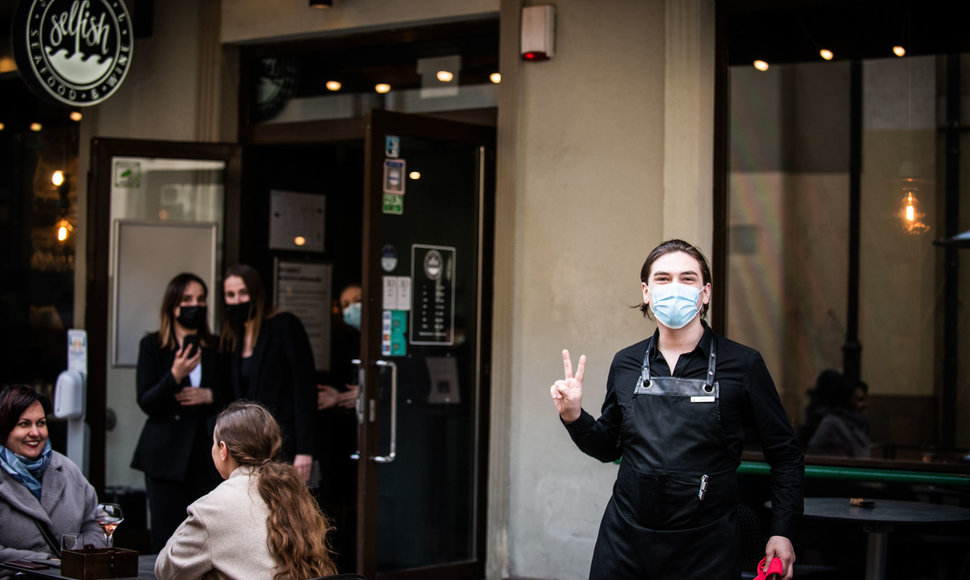This was revealed by a survey conducted in April 2021 by market research and tech company Synopticom which focused on urban residents with at least one social media profile. Compared to this time last year, the 2021 survey found that a much smaller proportion of Lithuanians were interested in information about COVID-19 – 20% versus 46.3% last year. This year the coronavirus has been overtaken by politics and the world events (27.8%), social topics (23.3%) as well as food and cooking (21.1%).
“We keep hearing in the public domain that people are really tired of the COVID-19 pandemic and the quarantine restrictions. This is only natural – we have been living in these conditions for over a year now. At the start of the first lockdown everyone hoped naively that the global pandemic would be overcome within a few weeks or months. Most people are trying to manage this exhaustion by reducing their intake of coronavirus-related information so the usual topics such as politics and social topics are beginning to dominate on social media once again,” says Linas Damanskis, partner at smart communications agency Idea Prima, which commissioned the study.
Even more time and attention to social media
Last year 46% of respondents indicated that they were spending more time than before on social media. This year this figure is at 42%. Meanwhile, 47% of respondents claimed that the quarantine has had no influence on the amount of time they were spending on social media.
“Data from this year as well as 2020 indicates that the restrictions imposed on our social lives tie us down to our computers and smart screens. Last year the time allocated to social media doubled, while this year’s data indicates that this amount is not decreasing. In fact, the amount of time spent in front of our screens continues to increase. Psychologists say that social media somewhat fills the current hunger for live interaction but is nonetheless incapable of satisfying it completely,” L. Damanskis points out.
Comparing the data from 2020 and 2021 shows that people searching for information or news on coronavirus are more likely to refer to social media this year –17.4% and 18% respectively. While the popularity of other information channels has declined slightly over the year, news portals remain in the lead (39.2% and 35.6% respectively), followed by TV coverage (29.6% and 28.8%).
“While traditional news outlets remain in the lead, social media is also gaining increasing significance when seeking coronavirus-related information – the more time people spend on it, the more information they find that they are interested in,” notes the communications expert.
Increasing distrust and discontent
The survey also revealed that people are increasingly more suspicious of any coronavirus information published on social media. Last year, 43% of Lithuanians trusted this information, while this year the number fell to 33%. Accordingly, there has been a rise in the number of people mistrusting information on social media – from 45% in 2020 to 48% this year.
People also feel less need for state institutions and government officials to actively provide updates on coronavirus situation and any related decisions on social media. Last year, 71% of respondents were interested, while this year the number was down to 60%. Respectively, there was an increase in the number of respondents not interested in this – from 25% to 34%.
“The survey once again confirms people’s exhaustion which I mentioned earlier – they are less interested in COVID-19, there is more distrust amongst the public. People experience a certain disappointment with the pandemic itself, the information around it as well as the government’s actions. Similar trends can be seen around the world,” says L. Damanskis.
Still care about the situation in Lithuania and scientific opinion
Residents of Lithuania have increasingly more negative views towards how state institutions communicate on social media and share information on coronavirus situation as well as notify the public of any decisions taken. Last year 50% of respondents thought that this kind of communication was effective, while this year the number was down to 31%. Last year, 31% of respondents rated the communication as ineffective, while this year this number rose to 51%.
The content which is of most interest to Lithuanians has not changed, only its ranking order. This year people in Lithuania were most interested in political decisions during the pandemic (51% as compared to 59% last year), news regarding scientific research of coronavirus (50% versus 57% last year), the spread of the virus and its management in Lithuania (49% versus last year’s 61%).
“It’s natural that people are still mostly concerned with the pandemic situation in Lithuania and what local politicians are doing to improve it. It is also encouraging to see that Lithuanians have not turned away from scientific discussions on the topic. We must do all we can to prevent disinformation and fake news dominating our information field,” the communications expert says.
Synopticom conducted the survey of Lithuania’s urban residents with at least one social media profile in April 2021. The survey included 515 individuals aged 18-60+.












